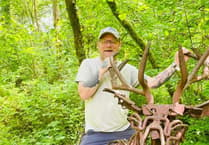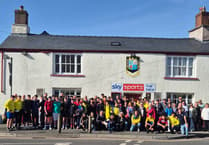THE life has been commemorated of one of the last Spitfire pilots who fought during the Battle of Britain.
The funeral of the late retired Squadron Leader Nigel Rose took place at St Eigon Church in Llanigon, the village where the 99-year-old had lived for 50 years until moving to nearby Hay-on-Wye four years ago, on Saturday.
A spitfire, Mr Rose’s favourite plane, from the Battle of Britain Memorial Flight performed a flypast at the funeral to honour the World War II veteran who died on September 10.
Mr Rose joined the RAF Reserves before the war, and served from the start of the conflict in 1939 as a Pilot Officer in the 602 Fighter Squadron.
The Scottish squadron which he had been assigned to, known as the City of Glasgow Squadron, flew down to join the Battle of Britain, which took place in the skies above the south of England from July 10 1940 to October 31 1940.
Mr Rose’s daughter, the novelist Barbara Erskine, who lives in Hay-on-Wye, said: “They would literally fight off the Germans as they were invading. They flew straight into the battle really, as each wave of Germans flew in, they went into intercept them and defend Britain.
“The one thing my father always said was that he didn’t have time to think while he was fighting like that, he didn’t have to think about what he was doing or whether he was scared or angry. It was quite an exciting and dangerous job.”
Mr Rose joined the RAF as a student pilot in 1938. According to Barbara, everybody knew there was about to be a war and her father desperately wanted to fly.
He had described his favourite plane as being “very small and nippy” and perfect for fighting off the Luftwaffe.
Barbara said: “On his 90th birthday we gave him a flight in a two-seater Spitfire. They normally only have one seat, but you do get the occasional one with two seats.
“He even took over the controls from the pilot while they were in air. He had to be certified by a doctor to say he was fit enough to do it, and he wasn’t allowed to take off or land.
“He said he was surprised by how quickly being able to fly came back to him, just like riding a bicycle I suppose.”
Mr Rose also taught other pilots and trained them in gunnery – he was known to be a good shot.
He met his wife, the late Pamela Rose, in 1941 when his squadron was posted to Sussex who welcomed the pilots to their local Squash Club. They met at a dance and fell in love, and he asked her to marry him before being posted back to Scotland.
After the war Mr Rose became a quantity surveyor. Barbara said: “One of the hardest things was that he’d gone from being in charge of a lot of men to being back at the very beginning of a career.
“It was very hard for him to go back to the beginning like that. He did eventually open his company called Nigel Rose and Partners in the end and he was very successful”.
Like many others who served Mr Rose didn’t talk about his experiences in the Second World War for a long time, being described by his daughter as “very modest”.
She said it wasn’t until later anniversaries of the war that he started to talk about it and realised that people were actually quite interested in what he had to say.
She said especially as he was a Spitfire pilot as they are “often portrayed as heroic swashbuckling young men”.
Barbara said: “He was a bit reticent to talk about it in the beginning, but he did start to talk about it later and after a while even enjoyed telling people about it later on.
“He certainly didn’t talk about it while I was growing up, he had friends who were still in the RAF and I grew up with their children, but I still didn’t really hear or know about it.”
Following the war, Barbara said that her father did keep in contact with a German pen-pal who he’d started writing to before the Second World War.
She said: “He was very fond of her and her family, and even went over to meet them after the war and I got to meet them as well. She actually sent him a letter in the year after the war which said “Are you still alive?”
Barbara said that her father, like many British servicemen at the time, knew there was a difference in opinions between most Germans and that of Hitler and the Nazis, and so was not angry at the German people.
The funeral was conducted by the Reverend Richard Williams and there was a wake held afterwards at Mr Rose’s favourite pub in Hay-on-Wye, The Old Black Lion on Lion Street.
It was attended by the Group Captain Patrick Tootal OBE DL who is the Hon Secretary of the Battle of Britain Fighter Association, as well as Air Commodore Alan Gillespie who was representing Prince Charles as he was unable to attend.
The funeral included a place for donations at the back of the church which will be sent on to the RAF Benevolent Fund and the Battle of Britain War Memorial Trust.
The war hero’s coffin was wrapped in a Union Jack with his medals on top. There will be a private cremation at a later date.




